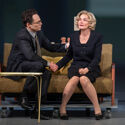
Glee is not real life. Pitch isn’t always perfect, slushies don’t splatter across faces so artfully, and teens don’t actually look like twenty-something adults.
Perhaps someone should’ve reminded the producers of The Glee Project about that!
Back in 2011, the Oxygen network capitalized off of the massive popularity of Ryan Murphy‘s musical dramedy Glee by launching a reality competition show intent on finding the series’ next big star. Over two seasons, The Glee Project ushered in some major talent (including future big names like Alex Newell and Ali Stroker), but behind the scenes, it sounds like the whole production was as messy and traumatic as, well, the version of high school depicted on Glee!
In a new oral history from Insider, show producers, mentors, and cast members open up about the chaos of bringing The Glee Project together, revealing that the show frequently wandered into moral grey area as it attempted to force real-life young people into archetypes and produced storylines more fit for scripted television.
How about we take this to the next level?
Our newsletter is like a refreshing cocktail (or mocktail) of LGBTQ+ entertainment and pop culture, served up with a side of eye-candy.
A lot of the series’ issues seem to stem from the fact that the criteria for the competition was a rather subjective experience. The cast wasn’t competing to prove who was the best singer, dancer, or all-around performer—it was about whose real-life story (and, sure, talent) was compelling enough to write them into a fictional TV show.
“It was about finding somebody Ryan could feel inspired to write a character for,” says Glee casting director Robert Ulrich. “That’s what made it stand out as a very unusual show.”
“Some of them could sing but didn’t have a story—they got the boot,” shares The Glee Project story editor Christopher Orne.
Related: A look back at the best gay-for-pay performances on “Glee”
On top of that, production sounds like it was frequently figuring things out on the fly, with cast members recalling a rushed, “boot camp”-like filming schedule with less than desirable filming conditions. For the first season, cast members were shacked up at a Jewish summer camp in bunk bedrooms with no AC—and they were warned to look out for ticks.
“It felt like half we were being detained against our will, and half ‘This is TV,'” shares former contestant Cameron Mitchell.
Tensions ran high, especially as cast members were eliminated week after week, notified via a Glee-esque casting notice. Naturally, competition got the best of everyone involved and personalities clashed, egos were bruised. Season two contestant Heather Grae recalls there being a psychologist on staff to help take care of everyone’s mental well-being.
Grae also remembers being encouraged to partner up with a male contestant—until production found out she was gay. Later in the season, facing elimination, Grae says the stress caused her to come out on stage, a moment the show ultimately decided not to air.
“I’m very thankful they didn’t air that,” shares Grae. “They could’ve. That would’ve been TV drama. If someone else had taken that from me, it would’ve wrecked me. I’m from Alabama, southern Evangelical culture. That sh*t don’t play down there.”
But The Glee Project wasn’t always so sensitive. For example, there was a theme week each season called “Vulnerability” which asked the young contestants to share some of their deep insecurities and secrets with the world.
“There are a lot of things on that show that, if they happened now, people would be getting canceled left and right,” says season two contestant Abraham Lim. “Certain things were handled poorly back then.”
In Lim’s case, he recalls being asked if he was “androgynous” and was even pressed to announce his sexuality or gender identity on camera.
“They were trying to get an admission of sorts from me, and I’m like, ‘You’re not gonna get anything, because I don’t know.’ I’m not gonna sell my soul down the river for a seven-episode arc on Glee. I’m figuring out who I am.”
Related: ‘Glee’ turns ten: Check out the the best covers from the show to celebrate
Years later, many of those involved have conflicting feelings about their time on The Glee Project, with some sharing warm memories about the deep bonds that it fostered, while others look back a little less fondly.
“It was abuse,” claims season one runner-up Lindsay Pearce, “whether they thought it was or wasn’t. They made a successful reality-television show, but the cost was high for some of us.” Still, Pearce says she doesn’t “hold any hatred or harbor any resentment” for anyone involved.
“There were so many great elements of the show,” remembers Lim, “but it was also really anxiety-inducing and there was a lot of trauma. Trauma bonds were made.”
In the end, it seems like the producers of The Glee Project took a certain Sue Sylvester quote a little too literally.
I am going to create an environment that is SO toxic. Sue Sylvester/white woman with short blonde hair in pink adidas tracksuit on GLEE reaction video meme pic.twitter.com/J6ZBERgxF7
— all reaction videos (@allreactionvidz) September 14, 2020




















bachy
Why I have no patience for so-called “reality” tv. It’s all narcissism and bullsh|t.
CatholicXXX
I am not surprised.
MrGoldman
Hunh? They entered a reality show competition for a role on a popular show about kids who are out and proud, but felt traumatized and were like, sort of, kind of like, um, like forced to come out? These people should get jobs in cubicles. They are not cut out to be actors.